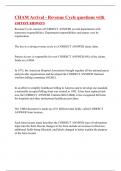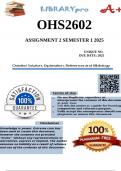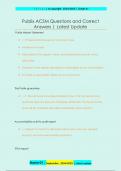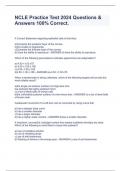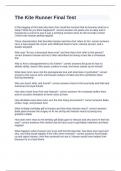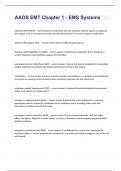solutions graded A+
Uncodified Constitution
The UK has a constitution but it has not been written down in one document. It is all over the place.
The UK constitution is based on laws passed throughout centuries, accepted conventions and
practices and legal decisions. The UK is also part of the European Convention on Human rights even
though not the EU. These all help define the UK constitution.
Flexible constitution
It can be amended to keep up with a public opinion. For example, gun control. In 1995 after a
massacre at a school in Dunblane the UK government severely restricted the ability of people to own
firearms, introducing tight gun control legislation. In the US constitution, the right to bear arms is
written the constitution for historical reasons - The founders of the US wanted to justify taking up
weapons to fight against the British. It is very difficult to amend the US constitution.
A codified constitution like in the US also has articles such as its first amendment which guarantees
the freedom of the press. In the UK it is easier to remove such individual rights and liberties so this
could be considered a disadvantage.
Parliamentary sovereignty
In the UK system, parliament, not the people, is sovereign. Many politicians who opposed EU
membership argued it was undemocratic and did so on the grounds of defending parliamentary
sovereignty. In reality, parliament is not entirely sovereign. First people vote in elections and this
limits what parliament can do and second people usually vote for a party and usually, though not
always, the parties control parliament.
Separation of powers
In the UK there is also in principle separation of powers. The House of Commons, the House of Lords
and the executive are all distinct with each balancing and controlling the other stopping either one
from becoming too powerful. In reality, the political parties dominate parliament. The Prime Minister
and ministers, who make up the executive all sit in parliament. It is parliament more often than not
which is controlled by the executive. For example, The parties and particularly the government have
the resources to hire special advisors, influence the media and develop policy. No other branch has
these same resources. In addition, the prime minister has the power to appoint members of the
House of Lords too which weakens their ability to provide a check on the executives' power.
Rule of Law
The law is applied equally to everyone, no one is above the law including political elites. In reality,
conventions are not laws. It is perfectly possible to do something which is unconstitutional but is not
technically illegal. An example would be the expense scandal or the cash for the honours system. We
of course also saw the supreme court declare null and void the suspension of parliament by the prime
minister. A prime minister who did something that was unconstitutional and also managed to get the
Queen involved in the process too. To argue also that everyone is treated equally is not entirely
accurate. For example, the Prime Minister's former advisor Dominic Cummings' breach of Covid-19
rules. He was allowed to stay in his position and it helped undermine trust in the government.
Common vs Statute Law
, Made by judges in court, using precedent - decisions made in previous similar cases - to decide how
they will judge a case before them. Statute law is made by parliament. For a bill to be passed, it must
be agreed to by a majority vote in both houses of Parliament. If no statute law applies to cover a
particular situation, the common law will apply; however, statute law always overrides common law.
Royal Prerogative
The UK has a monarch with symbolic power. The Monarch does regularly meet with the Prime
Minister and can advise and warn the Prime Minister but monarchical powers are in effect devolved
to the Prime Minister and his/her cabinet.
UK Constitution
Combo of statutory laws (acts of parliament), Common Law (judicial decisions) and tradition
Parliamentary democracy
"A form of democracy that operates through a popularly elected assembly and emphasizes the
importance of deliberation" (Heywood).
Roles of Parliament
1. Executive emerges from the party(s) that command the confidence of the House of Commons
2. Parliament is sovereign constitutionally
3. Parliament exists to approve legislation and hold the executive to account
4. Formatted around the principles of representation (territorial and national)
Parliament principles vs practice
Democracy originally means the rule of the people. However, in a representative system, this rule is
delegated to elected individuals. In the UK system, the elected representatives are members of
political parties and are not free to vote as they choose. Therefore, in practice, we have the rule "of
the many by the few". A system such as the UK which has its own 'Westminster Model' is designed to
be effective rather than accountable and this is reflected in the voting system. For example, there are
650 separate constituencies in the UK and they each elect just one Member of Parliament. Each voter
has one vote and they mark a cross next to their chosen candidate. The candidate with the most votes
wins. You do not need a majority to win a constituency, just more votes than the other candidates.
First-Past-The-Post
There is a clear and obvious link between the represented and the representative. In other words, an
MP represents a particular constituency. In addition, there is often a clear electoral choice. It tends to
produce two major parties and it provides a strong electoral mandate. Furthermore, you do not need
a majority of the votes, just a majority of the seats. It also reduces the chances of extremist parties
winning seats. However, there is a mismatch between what voters nationally have decided and the
actual outcome in parliament. It does not quite reflect how people actually voted. It results in wasted
votes. If you stay in a constituency that is regarded as a safe seat you may feel that it does not really
matter whether you vote or not. FPTP helps maintain a two-party system. It is extremely difficult for a
third party to breakthrough. For example, in 1983 the centrist parties gained around 26 per cent.
Labour gained around 28 per cent. The centrist parties won 26 seats. Labour won well over 200.
Therefore, the system encourages the notion that voters have a choice between two parties.

